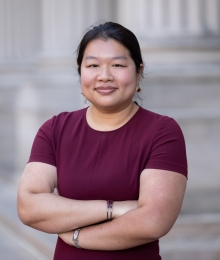P. Lawyer Leadership: Leading Self, Leading Others, Leading Change in Challenging Times
Course Information
- Course Number
- L8410-SEM
- Curriculum Level
- Upperclass
- Areas of Study
- Lawyering, Legal Profession and Professional Responsibility, Racial, Economic, and Social Justice
- Type
- Seminar
- Additional Attributes
- Tutorial Seminar, Experiential Credit
Section 001 Information
Instructor
 Eunice Hong
Director, Davis Polk Leadership Initiative; Lecturer in Law
Eunice Hong
Director, Davis Polk Leadership Initiative; Lecturer in Law
 Susan P. Sturm
George M. Jaffin Professor of Law and Social Responsibility
Susan P. Sturm
George M. Jaffin Professor of Law and Social Responsibility
 Richard Gray
Lecturer in Law
Richard Gray
Lecturer in Law
Section Description
From the outset of their careers, lawyers will occupy roles that call upon them to influence and persuade people, engage in difficult conversations, learn from mistakes, and interact effectively and equitably with people of different backgrounds, races, and identities. The Covid-19 pandemic, along with the national racial reckoning, have called upon lawyers to navigate these everyday interactions in particularly challenging times that demand the ability to address problems under conditions of uncertainty, to navigate conflict and change, to strategize and innovate, and to find novel ways to connect with people (including virtually). These challenges require lawyers to cultivate presence, awareness, resilience, racial literacy, and the ability to have difficult conversations. The capacities required by the current crises add up to leadership as we define it: collaborating effectively to achieve common goals.
This course will cultivate participants’ leadership capacities at the intrapersonal, interpersonal, and systemic levels. It will ground students’ learning in the issues and problems that matter most to them. Students will have an opportunity to develop and advance personal learning goals that will improve their capacity to interact effectively in groups, give and receive feedback, build constructive work relationships, build racial and cultural literacy, navigate new and challenging environments, achieve collective aims, and use their law degrees to have impact in diverse practice fields. Students will also pursue group impact projects that they identify as important to them, and to cultivate their leadership abilities in the context of advancing those projects. Students will also have the opportunity to receive individualized feedback and peer-to-peer coaching. The course participants are encouraged to build community among the broader CLS faculty, staff, students, and alumni interested in lawyer-leadership. Students will earn five experiential learning credits.
The class will meet in whole class sessions, lab groups, and two 5-hour workshops. Students will be enrolled in a Lawyer Leadership Project Work section, based on their schedule. All of the sessions will be highly interactive and experiential. Students must enroll in both this course and the Lawyer Leadership Project course. Admission to Lawyer Leadership is by application, available at https://docs.google.com/forms/d/e/1FAIpQLSee-KyCHYco7HAhZLu0qSlwBsmxKAbdABDBWPhZO-1NQ0lRog/viewform
We will consider applications on a rolling basis until the course is full. Students may be asked to participate in an interview. A course overview, along with last year’s syllabus, is available upon request. Students with questions about the course or the admissions process should email Professor Susan Sturm at [email protected].
- School Year & Semester
- Spring 2024
- Location
- JGA Greene Annex Lounge
- Schedule
-
Class meets on
- Monday
- Points
- 3
- Method of Evaluation
- Other
- J.D Writing Credit?
- Minor (upon consultation)
- LLM Writing Project
- Upon consultation
- Writing Credit Note
- With consultation, LLM writing projects may be pursued through Lawyer Leadership.
Learning Outcomes
- Primary
-
- At the end of the course, students will have acquired understanding of and/or facility in self-awareness and capacity to work effectively in groups.
- At the end of the course, students will have acquired understanding of and/or facility in understanding of systems thinking and improved capacity to have impact.
- At the end of the course, students will have acquired understanding of and/or facility in ability to give and receive feedback, have difficult conversations, and interact effectively across differences
- At the end of the course, students will have acquired understanding of and/or facility in cultural competence and reflective capacity.
- At the end of the course, students will have acquired understanding of and/or facility in ethical and professional issues.
- At the end of the course, students will have acquired understanding of and/or facility in values-based considerations in law-making.
- At the end of the course, students will have acquired understanding of and/or facility in use of other disciplines in the analysis of legal problem solving and institutions, for example, philosophy; economics, sociology and other social sciences.
- At the end of the course, students will have acquired understanding of and/or facility in understanding, using and critiquing secondary legal literature.
- At the end of the course, students will have acquired understanding of and/or facility in various lawyering skills, for example, oral advocacy, negotiation, mediation, working collaboratively, client communication, decision-making, strategy, and planning.
Course Limitations
- Instructor Pre-requisites
- None
- Instructor Co-Requisites
- None
- Requires Permission
- Yes
- Recommended Courses
- None
- Other Limitations
- Admission to the course requires instructor permission. Please see course description for application instructions. LLMs: only two of the three course credits will count toward the 24 credit minimum for the NY Bar."